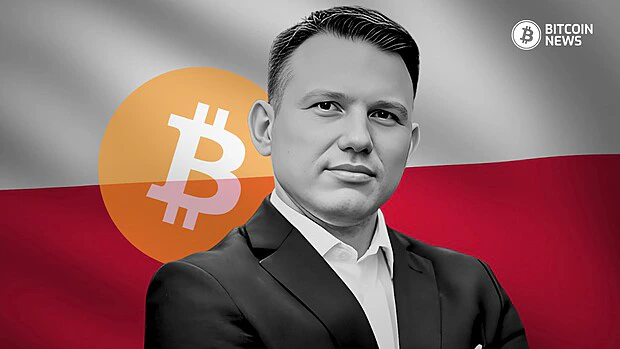Poland could soon make headlines in the Bitcoin world as Sławomir Mentzen, a candidate in the country’s May 2025 presidential elections, proposes a bold vision: the creation of a Strategic Bitcoin Reserve.
If elected, Mentzen promises to transform Poland into a global Bitcoin leader by adopting digital-asset-focused policies and fostering a supportive environment for innovation.
Mentzen’s campaign aligns with global trends that see governments increasingly considering bitcoin as part of their financial strategy. Mentzen stated in response to a question from Lech Wilczyński, CEO of Swap.ly exchange:
“Poland should create a Strategic Bitcoin Reserve. If I become the President of Poland, our country will become a cryptocurrency haven, with very friendly regulations, low taxes, and a supportive approach from banks and regulators.”
The Strategic Bitcoin Reserve, Mentzen argues, would not only enhance Poland’s financial resilience but also position the country as a forward-thinking hub for digital innovation.
“The draft bill on the Strategic Bitcoin Reserve is available for use. There is no point in waiting. Instead of passing nonsense bills on crypto assets, this should go first before it is too late,” Wilczyński had urged, pushing for immediate action on the plan.
Earlier this month, he marked the milestone of BTC hitting a record high and reportedly committed to holding onto his investments despite the rise in value.
Mentzen’s proposal is part of a growing international movement to integrate bitcoin into national financial strategies.
Earlier this year, U.S. President-elect Donald Trump announced plans for a similar reserve in the United States, with some suggesting the initiative could hedge against national debt. Trump’s proposal inspired states like Pennsylvania and Florida to explore their own bitcoin reserves.
Related: Pennsylvania Pushes Bill to Invest in Bitcoin as a State Reserve
Other countries have adopted bitcoin as well. El Salvador has already recognized bitcoin as legal tender and accumulated over 5,700 BTC, while Bhutan’s bitcoin reserves formed nearly 27% of its GDP in 2023.
Hong Kong is also exploring bitcoin’s role in financial reserves, reflecting a global trend that sees bitcoin as a hedge against economic uncertainty.
Anthony Scaramucci, a former official from the White House, highlighted these developments and stated:
“Strategic BTC reserve can be positioned as the new Fort Knox. Digital gold to support and back stop the USD.”
If elected, Mentzen promises to create a welcoming environment for digital asset enterprises. His vision includes lower taxes, clear regulations, and active cooperation with banks and financial institutions. This could attract global investors and drive innovation in Poland’s digital economy.
Mentzen’s manifesto appeals to Poland’s growing digital-asset-savvy population, many of whom view bitcoin as a hedge against traditional financial instability. These policies could set Poland on a path to becoming a global leader in digital asset innovation.
Mentzen’s passion for Bitcoin is personal as well as political. He revealed that he has been a long-time holder of bitcoin, having first purchased the asset in 2013.
“I have been holding Bitcoins for years, I have been holding cryptocurrencies. I bought them back in 2013; at the beginning of this year, I sold a little bit […], but I hold the vast majority. Some people accuse me of trying to sell cryptocurrencies and say buy them,” he shared in a recent interview.
Despite his advocacy, Mentzen is cautious about bitcoin’s risks. “I am absolutely not trying to sell cryptocurrencies to anyone; I have not bought any cryptocurrencies for years; it is a very risky investment,” he admitted, emphasizing the need for clear and supportive regulations to ensure stability.
While Mentzen’s proposal has sparked excitement, critics remain skeptical.
Bitcoin’s volatility and its potential risks as a reserve asset have raised concerns. Financial expert Michael Novogratz has pointed out that bitcoin’s unpredictable market might make it a challenging reserve option for some countries.
“It’s a low probability. While the Republicans control the Senate, they don’t have close to 60 seats. I think that it would be very smart for the United States to take the Bitcoin they have and maybe add some to it.” Novogratz claimed.
However, supporters argue that bitcoin’s scarcity and decentralized nature make it an ideal hedge against inflation and economic shocks.
With elections approaching in May 2025, Mentzen’s Bitcoin-forward policies could become a defining factor in Poland’s political and economic future. If his vision becomes reality, Poland could join a growing list of nations exploring Bitcoin’s role in financial systems.
As the global Bitcoin movement gains momentum, Mentzen’s proposal reflects a broader trend of embracing digital assets as a tool for national development. His plan, if implemented, could position Poland as a leader in Europe’s Bitcoin revolution.
One social media user summed it up perfectly: “The first in Europe, but not the last—that’s for sure.”
Whether Poland will move forward with this ambitious plan depends on the outcome of the election and the subsequent actions of policymakers. However, the proposal has already ignited a conversation about Bitcoin’s role in national economies.
If successful, Mentzen’s leadership could mark a transformative era for Poland, demonstrating how Bitcoin can be integrated into traditional financial frameworks while driving innovation and growth.










